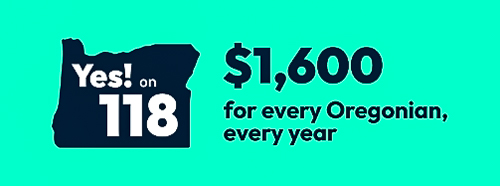We have fantastic news to share: Oregon Rebate has qualified for the November 2024 ballot as Measure 118!
Measure 118 will increase the minimum corporate tax rate after $25 million of in-state revenue by 3%. The proposed increase will raise at least $6 billion annually, which will generate $1,600 rebates for all 4.2 million Oregonians each year once fully implemented in 2027, according to estimates from the Legislative Revenue Office’s report.
$1,600 per year for a four-person household is $6,400 a year! Lump-sum payments like this can be enough to break debt trap cycles that keep Oregonians in poverty. The measure is projected to decrease the overall poverty rate in Oregon by 36% and childhood poverty by 53%. Together, we can make this possible by demanding that corporations finally pay their fair share.
Currently, the largest and most profitable corporations manage to pay minimal to no income taxes through various distortion tactics, using tax credits and incentives, or structuring maneuvers that minimize tax liabilities. Recent reports revealed that 34% of the largest corporations do not pay a single dollar in federal income tax. And despite reporting profits, seventeen major corporations, like Tesla and T-Mobile, not only paid no federal income tax over five years but received refunds. These same corporations paid their top executives a cumulative $5.3 billion over the same period in which they paid zero dollars to support essential public services or local aid.
If corporations can afford to rebate themselves, they can afford to rebate Oregonians.
Corporations like Comcast and their special interest supporters often use scare tactics like the threat of price increases when fairer corporate tax increases are on the ballot. But this is a distraction from their record-breaking profits. Corporate profits in 2023 were 54% higher than in 2019, largely due to inflation. A recent report indicates that 53 cents out of every dollar of inflationary price increases were due to corporate profits during the second and third quarters of 2023. Since the start of the pandemic, corporate greed accounted for nearly one-third of all inflation.
Establishment politicians in Oregon, including Gov. Tina Kotek and leaders in the state legislature, have joined with Koch Industries and special interest groups like the Western States Petroleum Association to oppose Measure 118. However, the Oregon Rebate team has seen a groundswell of support from everyday Oregonians and submitted over 170,000 signatures to gain ballot access.
It is the will of the people of Oregon who will decide the fate of Measure 118, not politicians who these very corporations often bankroll. We aren’t seeking the support of politicians because we don’t need it – the power is with us.
My ask is that you consider making a donation to our campaign. We’re in a great spot, but we need your support now more than ever. Thank you for considering.
In solidarity,
Antonio Gisbert
Chief Petitioner
OregonRebate.org



How would this increase in taxes affect the cost of goods sold in Oregon? If small manufacturers need to raise prices in order to accommodate the increase in raw materials due to the tax being applied in multiple stages before it gets to the end user, how is this offset by the theoretical rebate? And finally, does this money go towards the Oregon Rainy Day fund before being dispersed? And how would that affect the calculus?